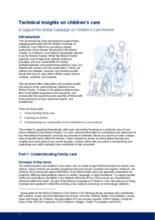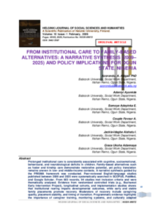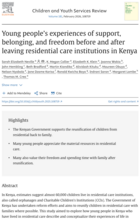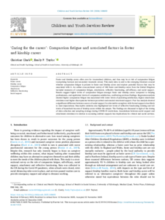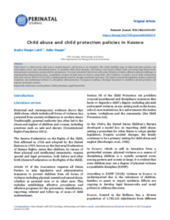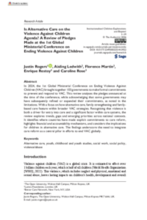Displaying 1 - 10 of 10887
This document has been developed to support those engaging technically with the Global Campaign of Children’s Care Reform by providing a deeper exploration of key themes introduced in the Global Charter on Children’s Care Reform. This document offers elaboration and practical insight into several of the central themes reflected in the Global Charter. It draws on the global evidence base, links to foundational guidance and standards, and incorporates the experience and expertise of those with lived experience of care, technical experts, and practitioners.
This study examined the relationship between disability type and service receipt among U.S. transition-age youth aging out of foster care, a population in which 53% have a diagnosed disability, across all U.S. states, Washington, DC, and Puerto Rico.
This study examined differences in emotional and behavioural problems among 400 adolescent orphans in Kerala, India using the Strengths and Difficulties Questionnaire to assess how sociodemographic factors shape mental health outcomes. The findings revealed significant variations by gender, religion, type of orphanhood, length and type of institutional care, underscoring the need for tailored psychosocial interventions that reflect these differences.
This article reviews global evidence on the impacts of institutional care versus family-based alternatives and examines how these findings inform foster care reform in Ogun State, Nigeria. It synthesizes research from 2009–2025 to identify key developmental outcomes, implementation lessons, and policy priorities for transitioning away from institutional care.
In Kenya, young people’s experiences of residential care and life after leaving care highlight trade-offs between material support, emotional guidance, and personal freedom. The study emphasizes that family strengthening and individualized case management are crucial to support children reunifying with families and successfully transitioning out of residential care.
This study examines the presence of compassion fatigue among foster and kinship carers in the United Kingdom and explores factors associated with it using survey data from 180 caregivers. Findings indicate that carers experience higher levels of compassion fatigue than helping professionals, with greater fatigue linked to lower parenting satisfaction, attachment avoidance, and unmet expectations of social support, highlighting important implications for social and clinical support systems.
This article explores a pilot study in Italy in which care-experienced young people acted as co-researchers to examine perceptions of child maltreatment and state intervention, focusing on the co-construction of knowledge between survivors and academic researchers. It finds that peer-led research strengthens epistemic justice and professional practice by integrating lived experience with academic analysis and fostering relational, supportive spaces for young people’s voices in care proceedings.
This article examines child abuse in Kosovo by analyzing policy gaps, risk factors, legal frameworks, and challenges in implementing child protection laws, drawing on interviews with senior Ministry of Justice officials and national data. It highlights a significant rise in child victimization between 2020 and 2022 and recommends legislative updates, institutional reforms, and the development of a national strategic document to strengthen child protection systems.
This article investigates the deinstitutionalisation of children with disabilities in times of armed conflict, taking the situation in Ukraine as a case study. It argues that a proper implementation of the right to independent living involves adopting a human rights-based approach that considers all the socio-economic rights of children with disabilities with due regard for the knowledge and expertise existing within families.
In 2024, the 1st Global Ministerial Conference on Ending Violence Against Children (VAC) brought together 103 governments to make formal commitments to prevent and respond to VAC. This review analyses the pledges announced at the time of the conference, while acknowledging that some governments may have subsequently refined or expanded their commitments, as noted in the limitations.

